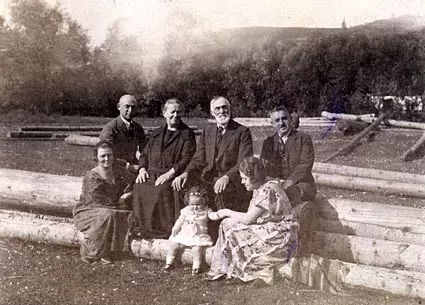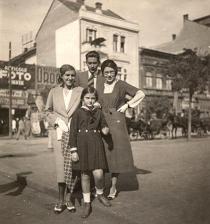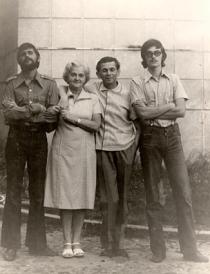This picture was taken in the mill in Lonya on the occasion of a family reunion, that is my grandparents, the Riegelhaupts, my father's parents, who lived in Czechoslovakia, they were visiting us. In the center of the picture the two older persons are my grandfather Samuel (Samu) Riegelhaupt and her second wife, whom I only knew under the name of Mrs. Friss. Next to grandpa, on the right, that's my father Fulop Riegelhaupt, my mother sits in front of him, I am that little extremely flap-eared child, that's why they tied them with those ribbons. I was around 1 year old. On my grandmother's right that's my father's brother Sandor, and his wife Regina is in front of him. They had no children. In the back you can see the logs in the mill of Lonya.
My grandfather was the under-steward of a landlord. When I met him, that is as I remember him, he was an old man, he was already retired, he got a pension from the landlord, because he managed so honestly for so many years the estate.
My paternal grandparents had two sons, my father, Fulop, and his younger brother, Sandor. There were no more children, because his first wife died in 1890, when the younger boy was born. My grandfather remained alone with two little children, he got married with a widow. I don't know the name of my step-grandmother, she was called Mrs. Friss, she was Jewish. I don't remember her at all, but I know she brought up her stepsons very fine, just as like her own child whose name was Armin Friss. He was older that my father, but they grew up together, like full brothers.
My grandmother's siblings, the Goldmans, built a lumber factory in Lonya, Lonea in Romanian. This is a coal mine settlement in the county of Hunyad. Lonya is near Petrozseny, a few kms away, then comes Petrilla [the distance between Petrozseny and Petrilla is 5kms]. These are all coal mine settlements in the Zsil valley. There was this lumber-mill and this is how my uncle Sandor ended up there at the age of 15 to learn timbering. I don't know exactly how their life went on, but it is a fact that they got to the Zsil valley [together with my father] when they were already adults, and it was still a Hungarian world then [Editor's note: Zsuzsa Diamantstein refers to the Austro-Hungarian Monarchy] and so they remained here, in Romania [Editor's mote: that is Lonya got under Romanian authority after the Trianon Peace Treaty] My father was the manager of the lumber-mill and my uncle did the business part, he traveled, he was a timber merchant. The timber merchants had to bargain all the time, but this was only for a short period, because my father got sick and slowly the mill was closed down.
They lived wonderfully there, my mother was faring well, she was coddling, she didn't work anywhere. She was on very good terms with her sister-in-law, Sandor's wife, they had the same age. Her sister-in-law was born in Vulkan, (Vulcani in Romanian). Her name was Regina Lovi, she was a Jew, my uncle worked there and they ended up so, they got married very young.
After my father died, uncle Sandor managed the factory for a while, then it became a stock company. We had no stocks there, but the truth is I don't know what happened after that. I remember that the lumber-mill operated for a while. After that it was closed down, before World War II, already in the old Romanian era. Each year I used to go to my uncle in Petrozseny, my father was already dead, but we always got to Lonya, to see what's going on. When the holiday began, I spent the summer holiday at my uncle's - I went by myself there. This was my second home.
I have nice memories about Petrozseny. It was an interesting small town, Petrozseny was a miner town, it was asphalted, had water piping, in a word there was a very cultured life, the inhabitants lived well there. I have nice memories about Petrozseny. I went to my uncle for many years, until Northern Transylvania was reannexed to Hungary [in 1940]. My uncle was like a father to me.My uncle didn't like the timber business, and after World War II he became a photographer, this was his hobby. He became a professional photographer, but he had no private studio, he was the press photographer of the Romanian newspaper from Petrozseny. They liked and respected him all over the town. He was a very honest man. Naturally, after World War II I contacted my uncle. [After returning from the deportation] I visited him, and I was on the point of moving there, but in the meantime I got acquainted with my husband and I married him in Vasarhely. My uncle wasn't religious at all, but he stuck to his Jewish origins. My father's younger brother died in 1981 in Petrozseny, he is buried in the Jewish cemetery. His wife, Regina, who died in the 1960s is also buried there.























